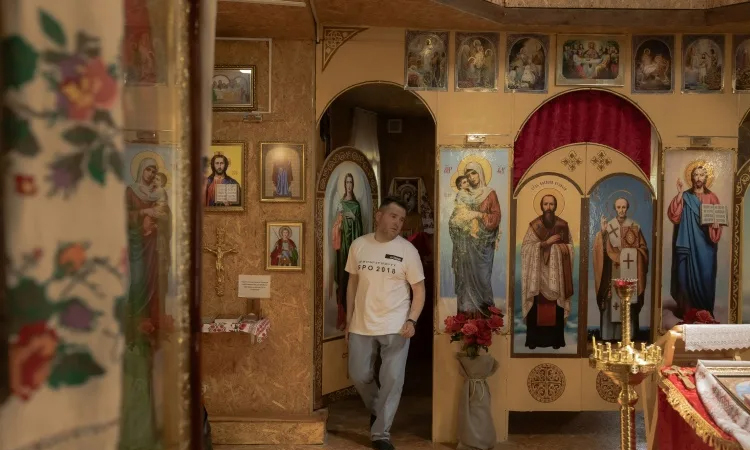News Flash
News Flash

KRAMATORSK, Ukraine, Sept 18, 2025 (BSS/AFP) - Near bloody battles between Ukrainian and Russian forces in east Ukraine, a very different kind of conflict is taking place: a battle for believers' souls.
Two rival Orthodox churches -- one set up with Ukrainian government backing in 2018 and the other an older church tied to Moscow -- compete for followers in Kramatorsk, some 20 kilometres (12 miles) from the front line.
Kyiv has sought to ban the Moscow-linked Ukrainian Orthodox Church (UOC), arguing Russia has used it to spread influence, and accusing many of its priests of being Russian agents.
Most Ukrainians have switched to the newly created Orthodox Church of Ukraine (OCU). But some in the east -- typically older, Russian-speaking parishioners -- are hesitant.
In a narrow wooden chapel made partly of chipboard, Archpriest Oleksandr Tkachuk of the Kyiv-backed OCU gave an impassioned homily to his congregation, just a handful of people.
"Beware of false churches, false prophets," he told them.
Built in 2019, his church has fewer followers and has struggled to expand its flock.
Tkachuk is convinced his rival, the UOC, is an arm of Russia.
"It's just the FSB (Russian intelligence agency) under the guise of the church," he said, packing up his altar.
Russia's 2022 invasion prompted many Ukrainians to cut ties with anything associated with Moscow.
Last year, 56 percent of the population said they belonged to the newer OCU and six percent to the Moscow-linked UOC, compared to 34 percent and 15 percent respectively in 2020.
But in Kramatorsk, most in the church pews are elderly, often nostalgic for the Soviet era, when many earned good salaries in the region's coal mines.
- 'Holy war' -
Tkachuk, who is pro-European, stands out in his home town.
He sports a T-shirt and is clean shaven -- in stark contrast to the typical long hair and beards worn by most priests of the other church.
"I want to put up pews like the Catholics. What's all this about standing for hours?" he said, echoing the recommendations of his church leader, Epiphanius, who supports reforms.
His parishioners were also hostile towards their rival.
"We pray to Epiphanius, not Onufriy," said 63-year-old Mykola, referring to the head of the Moscow-backed UOC.
In July, Kyiv accused Metropolitan Onufriy of having acquired Russian citizenship, despite the cleric condemning Russia's church for backing the invasion.
Mykola's son was killed in Ukraine's pro-European 2014 revolution. His village, Novopavlika, was razed by Russian bombs in 2023.
"All of Kramatorsk attend Russian churches," he vented, demanding they be closed.
Since the invasion, Ukrainian authorities have launched criminal proceedings against 180 UOC priests, usually on suspicion of being Russian agents, Ukraine's security service told AFP.
The UOC says it has condemned the war, broken ties with the Kremlin and that Kyiv's suggestions otherwise are false.
It says it no longer commemorates the Russian Orthodox Church's Patriarch Kirill, who has called the invasion of Ukraine a "holy war".
But Father Oleg, a Ukrainian military chaplain standing on steps of his preferred church, was not convinced.
"Russia is using the Church as a political tool to influence people's minds," he said.
- 'Orthodox means conservative' -
Kramatorsk's Holy Trinity Cathedral -- part of the Russian-affiliated church and built in 1996 -- was packed.
About 100 elderly people stood in prayer.
Bells rang, some knelt and rested their foreheads on the ground.
In one room, a socialist realist-style painting of a muscular Jesus adorned the wall -- a sight typical in Soviet-era churches.
"The more you forbid something, the more people want it," said 48-year-old Archpriest Sergiy Kapitonenko with a smile.
He compared the drive against the Russian-affiliated church to the "persecution" of believers under the Soviet Union.
Ukrainian soldiers came to pray at his cathedral, he said, adding that he prayed for Ukraine.
But he refused to ally himself with the new church.
"Orthodox means conservative," he said.
"That has been the essence of our church for 2,000 years."
Leaving the cathedral, 22-year-old Roman Salnykov, who came from Kyiv to experience the atmosphere of war in Kramatorsk, said he visited both churches and saw "no major difference".
Perhaps the only variety is in the priests themselves?
"Of course, I completely agree," he added.